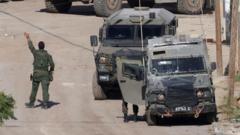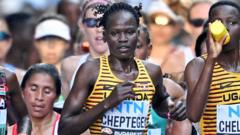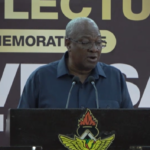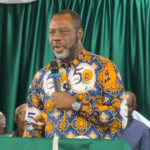The killing of Ugandan Olympian and long-distance runner Rebecca Cheptegei has devastated her friends and family – and has left the East African athletics community reeling.
Cheptegei died on Thursday morning after suffering severe burns – her ex-boyfriend doused her in petrol and set her on fire on Sunday outside her house in north-west Kenya.
Speaking outside the Kenyan hospital where her daughter had been treated, Agnes Cheptegei was only able to pay a brief tribute, describing her as kind-hearted.
Her sister, Violet, broke down as she said: “I’m in pain but we leave it to God.”
Cheptegei had just returned from church when she was attacked by her former partner, Dickson Ndiema Marangach, police say. Her two young daughters are reported to have to have witnessed it all and tried to intervene.
Her friends and fellow athletes have described her as a generous and kind athlete.
James Kirwa – who was Cheptegei’s occasional training partner – spoke the BBC hours after her death.
He remembered the 33-year-old as an experienced athlete who was kind to her teammates on the running circuit.
“She was a very affable person and was always very helpful and helped us all even financially. She brought me training shoes when she came back from the [Paris] Olympics,” he said.
The mother-of-two had been in the French capital competing in the marathon, coming 44th in a time of two hours, 32 minutes and 14 seconds.
In comparison to other runners in the region she achieved modest success.
But you don’t have to win medals to earn money – and she was still able to help support her family with her earnings from participating in races.
At 19, she first represented Uganda in an under-20 race at the 2010 World Cross Country Championships.
Over time she transitioned to longer road races, achieving success later in her career.
Her most notable victory came in the up-and-downhill mountain race at the 2022 World Mountain and Trail Running Championships in Chiang Mai, Thailand.
She made her marathon debut in 2021 and recorded a personal best of two hours 22 minutes and 47 seconds the following year, making her the second-fastest Ugandan woman of all time.
For much of her running career she was also a member of the Ugandan army, achieving the rank of corporal.
Athletes in East Africa often join their country’s army for the financial backing it allows them – and they get to train on the track instead of serving in the field.
Not much is known about the circumstances of how Cheptegei joined the Uganda People’s Defence Forces, but she was a member of its athletics club and represented her country on the track at the World Military Games in Rio de Janeiro in 2011.
Because of her 14 years of international competition, Kirwa said he looked up to her as an older sister – someone he turned to for support.
“When I first started, I almost gave up because it was very difficult, but she told me you must solider on,” he said.
The region borders her home area in Uganda and is close to Kenya’s elite athletics training centres, which was why she lived there.
Ugandan athlete Immaculate Chemutai, who had been visiting Cheptegai at the hospital with others like Kirwa, said she had hoped her friend might survive as she had improved by Wednesday evening “and the breathing was somehow settled”.
“In the morning I received the phone call and the doctor told us that we’ve lost her. It’s really sad. Rebecca, she has been so good to us. She is very lovely… a good person,” she told the BBC.
“She likes her family so much, especially the girls.
“And she sometimes supports us if we need some loan or something like that we can request it and she can give.”
Her father Joseph Cheptegei reiterated this when he said: “We have lost our breadwinner.”
He added that he was now worried about the two girls’ education without their mother to support them.
The impact of her death is being felt beyond her immediate family and friends.
For some it fits into a wider pattern of violence against women in the region where top athletes are not protected by their status.
“I can say we are still in shock, and we are in pain, especially as athletes, and this thing happening in Kenya, this is [another] time an athlete is being attacked… so we are not happy,” Kenyan runner Milcah Chemos Cheywa said.
In 2021, world-record holder Agnes Tirop was stabbed to death and six months later Damaris Mutua was strangled. Their partners were identified as the main suspects in both cases by the authorities.
“We urge the public, sports bodies, and the government to unite in taking meaningful steps to protect women and girls, ensuring that not more lives are lost,” said Tirop’s Angels, a group set up in the wake of Tirop’s killing.
Sebastian Coe, the president of athletics’ world governing body, said his organisation would work with groups on the ground to see how female athletes could be better protected “from abuse of all kinds”.
He mourned an athlete who he said “still had lots to give”.
For Kirwa, Cheptegei’s death represents a profound personal loss and he said he had cancelled his participation in Sunday’s Nairobi City Marathon as he was so upset and “not in a good place mentally”.
Go to BBCAfrica.com, external for more news from the African continent.
Follow us on Twitter @BBCAfrica, external, on Facebook at BBC Africa, external or on Instagram at bbcafrica, external

















